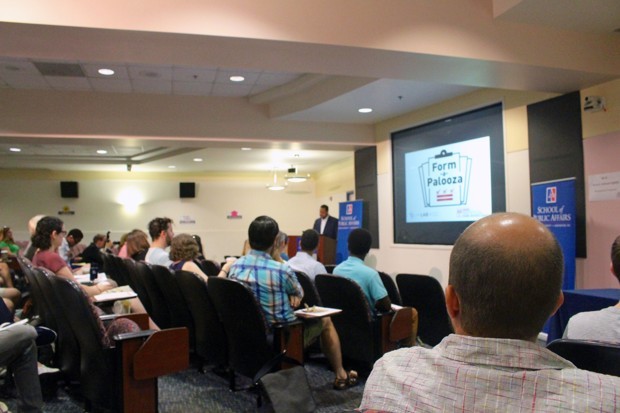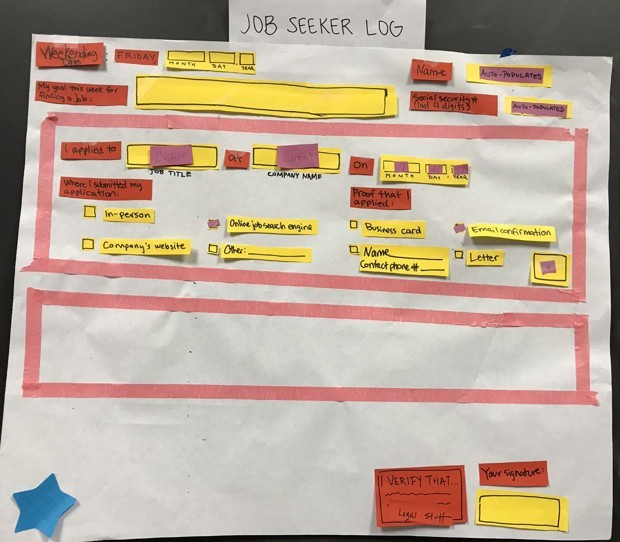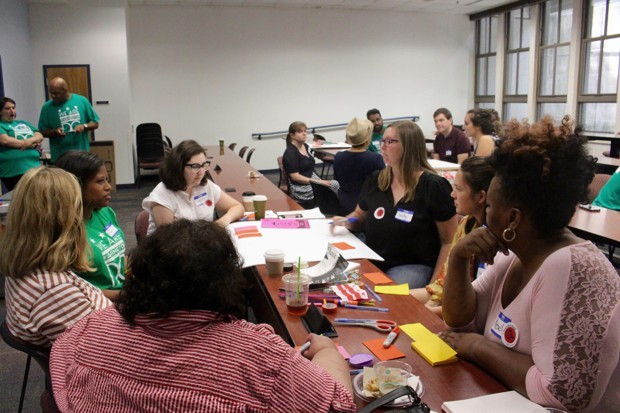Connecting state and local government leaders
D.C.’s new innovation lab wanted to redesign red tape, and the city’s wonks were eager to help.
On a punishingly hot Saturday morning in July, dozens of D.C. residents filed into a college auditorium to talk about paperwork.
Not to fill anything out, mind you. No one was sacrificing an opportunity to snooze on a blistering summer weekend morning for the sake of checking a major chore off the list.
Instead, attendees assembled to play team-building icebreaker games—about forms. They shouted call-and-response answers to free-association prompts—about forms. And they filed into breakout sessions to drill down deep in discussion—you guessed it—about forms.
“I thought everybody was going to want to do the DMV form,” one attendee remarked in line for pastries and coffee.
“The most interesting one is probably going to be the job search one,” replied the man behind him. “It’s a challenge you might not have considered before.”
Form-a-Palooza—the honest-to-goodness name of the event—drew nearly 90 residents from all eight wards in the District for a seven-hour hackathon. Their task: Redesign some of the city’s most notorious (and most common) forms from the ground up. Most of the attendees were what you might expect: government workers, earnest bureaucrat types. Several road-tripped all the way up from the Center for Advanced Hindsight, a behavioral economics lab at Duke University in Durham, North Carolina. Add in the 30 or so D.C. government employees on hand, and by the attendance figures alone, Form-a-Palooza was a smashing success.

Not a bad first outing for The Lab @ D.C., a new team launched by the D.C. government to coordinate innovation across city agencies. Funded by a $3.2 million grant from the Laura and John Arnold Foundation, the 15 or so social scientists working for The Lab @ D.C. aim to use empirical research, user-oriented design, and data-driven tools to weave science into day-to-day government operations.
For over a year now, analysts with The Lab @ D.C. have been working with the Metropolitan Police Department to conduct the world’s largest randomized control trial of police body-worn cameras. The team is also working with D.C. housing and homelessness agencies to design and evaluate a pilot program for a flexible rent subsidy. And they’re analyzing 311 call requests to develop a predictive analysis system for where rat infestations are most likely to pop up.
While several ongoing projects have been in the works since January or even longer, Form-a-Palooza was the official launch party for The Lab @ D.C. It’s going to be hard to top.
“I think that was probably the most excited group of people about government forms that’s ever been assembled,” says David Yokum, director of The Lab @ D.C.
He’s not lying: As proceedings kicked off, a city employee led the crowd in a chant: “Everybody say forms!”
“Forms!”
People didn’t show up at Form-a-Palooza to wild out, exactly. They were there to put in the work toward a modest-yet-totally-ambitious goal: to improve the experience of filling out forms. That’s enough to lure over-stimulated D.C. wonks to American University on a Saturday.
“As a government, we’re committed to customer service,” City Administrator Rashad Young said during his welcoming remarks, “and one of the most common ways we interact with the government is forms.”
So what happens at a Form-a-Palooza? After an introductory session, attendees split up into rooms organized by forms. There they split further into teams of four or five residents, plus a District employee or a behavioral scientist (or both). Representatives from the D.C. government explained what forms such as, say, the Disability Services Intake Application needed to accomplish. Then it was off to the races, as each team crafted a prototype form (using paper, scissors, and markers). The results of these team exercises would be synthesized later. D.C. Mayor Muriel Bowser dropped by, and Cass Sunstein gave the keynote for the day.

Dulce Sotelo, a paralegal for the Central American Resource Center, says that she showed up at Form-a-Palooza to see what she could do to improve the form for the limited-purpose driver’s license. This is a license that allows people without a Social Security number to drive legally. Many of her clients in the Latino community have to deal with it. While Spanish-language access in the D.C. Department of Motor Vehicles has improved, she says, it’s still a complex form that requires five different kinds of identification to demonstrate place of residence, length of residence, and so on. “I wanted to be able to fully understand the form and be able to assist them to know exactly what documents they need,” Sotelo says.
Maybe the most complicated bit of paperwork in the District of Columbia is the job search log required by beneficiaries of the federal Temporary Assistance for Needy Families program. People who receive TANF benefits must spend a certain amount of time applying for jobs each week. To demonstrate their compliance, beneficiaries keep a job-search log, which they must submit to TANF Employment Program service providers for verification, which then goes on to the D.C. Department of Human Services for auditing and other stakeholders. Paperwork accrues at every step.
A break-out session tasked with improving the flurry of forms associated with TANF established three goals from the jump: to confirm job-search compliance for TANF’s purposes, to make sure TANF users receive their benefits, and—ideally—to help case-workers steer beneficiaries toward jobs or skills programs for which they are best suited.
“When forms don’t work, people don’t get food,” Barbara Kingsley from the Center for Plain Language told the crowd at the beginning of the day.

Rachel Kahn—who trekked up to D.C. from Duke’s Center for Advanced Hindsight—explained a well-known behavioral experiment mentioned during the opening session, one pertinent to the task at hand. Designed by Dan Ariely, who heads up her lab, the experiment involved choosing magazine subscriptions. At one point back in the 2000s, The Economist offered three subscription tiers: online only ($59), print only ($125), and print plus online access ($125). Intrigued by the inexplicably irrelevant alternative (who needs a print-only subscription?), Ariely conducted a test. Given all three options, 84 percent of his students preferred print plus web, while 16 percent opted for web only. But when the irrelevant alternative was eliminated, print-plus-web subscriptions plummeted to 32 percent, with fully 68 percent choosing to go web only.
The takeaway? Behavioral strategy is key to designing red tape that works for residents, not against them. In other words, a well-designed form can encourage people to make better decisions.
“[Form-a-Palooza] seemed like a very unique opportunity to be able to apply behavioral interventions,” Kahn says. “There are so many things that can be simplified and amended with our function in our day-to-day lives, especially with government forms.”
Raising awareness about the central place of design in interfacing between local government and residents was one goal of Form-a-Palooza, Yokum says. “But the further hope was actually having better forms because of the people we had around the table, including residents who use these things,” he adds. “There were perspectives that came about that just wouldn’t have, if we had only had the agencies and the behavioral-design experts at the table.”
Two weeks after Form-a-Palooza, the party won’t quit. According to Karissa Minnich, operations analyst for The Lab @ D.C., members of the team met with five agencies during the first week of August to go over the results. For each of the forms that folks workshopped at Form-a-Palooza—from the quintessential driver’s license drudgery to the Basic Business License application—The Lab @ D.C. submitted a working prototype for a new-and-improved form.
“We’ll be working with some UX designers later this month, hopefully Code for D.C., to further fine-tune [the forms], and then running some focus groups before they are ready to be put in the field,” Minnich says. “Ultimately we hope to have the new forms in use some time this fall.”
The Lab @ D.C. operates under the Office of the City Administrator’s Office of Performance Management, which puts it close to the hub of D.C. government—which, Yokum says, enables it work centrally across a lot of different parts of the city. The grant from the Laura and John Arnold Foundation gives the team through December 2018 to make its case to leaders for future funding.
“We like to evaluate things. We of course want to evaluate ourselves,” Yokum says. “[This runway] has given us room to get enough projects off the ground to show the value that we’re all passionate will do so in a way to convincingly make the case that this is something well worth spending taxpayer dollars on. Because it will make us spend all the rest of the money more effectively.”
If the efforts to boost bureaucracy for D.C. residents ultimately end with better forms, then The Lab @ D.C. will have done a huge service for the city. Form-a-Palooza also tapped into a vast local resource that sometimes goes unrecognized in D.C.: all the brainy busybodies who believe in process and just want to help.
“I can’t think of a better way to spend a Saturday,” Young told the group that morning. The audience laughed. But it wasn’t in total disagreement.
Kriston Capps is a staff writer and Gracie McKenzie is the social media editor for CityLab, where this article was originally published.

NEXT STORY: Help Us Crowdsource State and Local Government News Links



